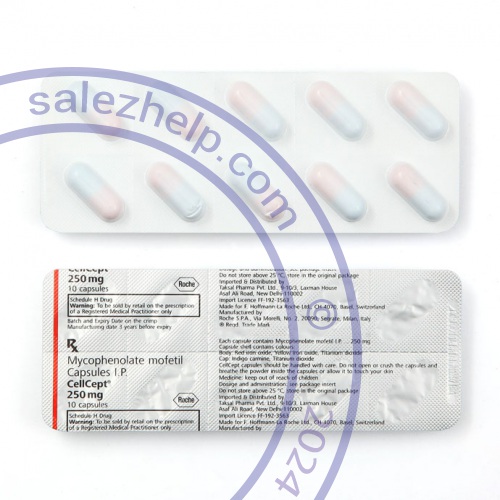CellCept Singapore
Cellcept, also known as Mycophenolate Mofetil, is a medication commonly used in organ transplant patients to prevent organ rejection. It works by suppressing the body's immune response to treat autoimmune diseases as well. Potential side effects include gastrointestinal disturbances, blood count changes, and increased susceptibility to infections and malignancies. Regular monitoring is required while on this medication.
- 250mg
- 500mg
What is Cellcept used for?
Cellcept, or Mycophenolate Mofetil, is a drug that is primarily used to prevent organ rejection in individuals who have received a heart, liver or kidney transplant. It is part of a class of drugs known as immunosuppressants. In addition to preventing organ rejection, it is sometimes used to treat autoimmune conditions like lupus and rheumatoid arthritis.
How does Cellcept work?
Cellcept works by suppressing the immune system. It does this by inhibiting an enzyme known as inosine monophosphate dehydrogenase (IMPDH) that is important in the replication of cells that are part of the immune response. By curbing the immune response in this way, Cellcept can help to prevent the body from attacking transplanted organs.
How should I take Cellcept?
Cellcept can be taken by mouth in the form of tablets, capsules, or as liquid suspension. It is usually taken twice a day on an empty stomach, one hour before or two hours after meals. Always follow your doctor’s instructions closely and never adjust your dosage without their advice.
What are the possible side effects of Cellcept?
Common side effects of Cellcept may include upset stomach, nausea, diarrhea, and vomiting. Less common but more serious side effects can include blood and bone marrow problems, severe infections, and increased risk of certain types of cancer, especially skin cancer. If you notice anything unusual, please contact your doctor immediately.
Can Cellcept interact with other drugs?
Yes, Cellcept can interact unfavorably with several other drugs, including antacids, certain antibiotics, and immunizations. Always keep your healthcare provider informed about all medications you are currently taking or planning to take, to prevent any potential drug interactions.
Is it safe to take Cellcept during pregnancy?
Cellcept may cause harm to an unborn baby, therefore, it should not be used during pregnancy unless the potential benefit justifies the potential risk. Women of reproductive age taking Cellcept should use effective contraception during treatment, and for six weeks following cessation of treatment.
Can I stop taking Cellcept abruptly?
No, stopping Cellcept abruptly may increase the risk of organ rejection or other health complications. Always consult your doctor before making any changes to your medication regimen.
Can Cellcept cause weight gain?
Weight gain is not a commonly reported side effect of Cellcept. However, everyone reacts differently to medications, and in rare cases, weight changes may occur. If you notice significant weight gain or loss while taking Cellcept, contact your doctor.
How should I store Cellcept?
Cellcept should be stored at room temperature, away from light and moisture. Keep it out of reach of children. Do not store it in the bathroom. Discard any liquid form of this medication that is older than 60 days.
What are known local names of the medication?
- Myfortic
- Mycophenolate sodium
- Mycophenolic acid
- Mycophenolate mofetil



